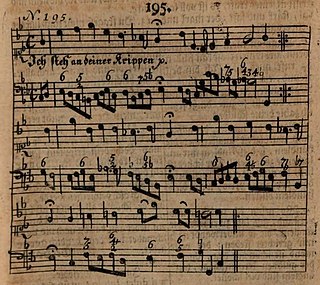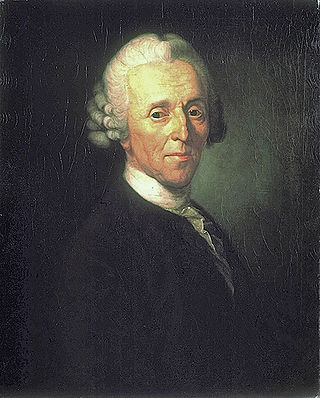Related Research Articles
Dieter Trautwein was a German Protestant theologian and writer of numerous Christian hymns of the genre Neues Geistliches Lied (NGL).

"Gott sei gelobet und gebenedeiet" is a Lutheran hymn of 1524 with words written by Martin Luther who used an older first stanza and melody. It is a song of thanks after communion. Luther's version in three stanzas was printed in the Erfurt Enchiridion of 1524 and in Johann Walter's choral hymnal Eyn geystlich Gesangk Buchleyn the same year. Today, the song appears in German hymnals, including both the Protestant Evangelisches Gesangbuch, and in a different version in the Catholic Gotteslob.

Lothar Zenetti was a German Catholic theologian, priest, and author of books and poetry. In Frankfurt, he was both a minister for young people and a parish priest. He was also active on radio and television. His songs, for example the popular "Das Weizenkorn muss sterben" and "Segne dieses Kind", appear in both Protestant and Catholic hymnals.

Neues Geistliches Lied, abbreviated NGL, is a music genre of songs in German intended for church usage, and based on contemporary lyrics and with music by contemporary composers.

Eugen Eckert is a German social worker, minister, singer-songwriter and academic teacher. He is known for his lyrics for new spiritual songs, and his oratorios and musical plays.

"Allein Gott in der Höh sei Ehr" is an early Lutheran hymn, with text and melody attributed to Nikolaus Decius. With the reformers intending church service in German, it was intended as a German version of the Gloria part of the Latin mass, used in almost every service. Decius wrote three stanzas, probably in 1523, while a fourth was added, probably by Joachim Slüter.

"Von guten Mächten" is a Christian poem which Dietrich Bonhoeffer wrote in 1944 when he was imprisoned in the basement prison of the Reich Security Main Office because of his resistance to the Nazis. It is his last theological text before he was executed on 9 April 1945. It became a frequently sung hymn, with different melodies, which has appeared in current German hymnals. The incipit is: "Von guten Mächten treu und still umgeben", which can be translated word by word as: "By good forces devotedly and quietly surrounded", or, in a more poetic, singable, widely used version: "By loving forces silently surrounded, ...". The seventh and last stanza "Von guten Mächten wunderbar geborgen" respectively "By loving forces wonderfully sheltered" is used as a refrain in this popular rendition.

"Macht hoch die Tür" is a popular German Advent hymn, written in 17th century Ducal Prussia. The lyrics were written by Georg Weissel in 1623 for the inauguration of the Altroßgärter Kirche in Königsberg. The melody that is now associated with the text appeared first in 1704 in the hymnal by Johann Anastasius Freylinghausen.

"Ich steh an deiner Krippen hier" is a German Christmas hymn, with lyrics by Paul Gerhardt which were first published in 1653. It was then sung with an older melody by Martin Luther, but a melody which was likely created by Johann Sebastian Bach for Schemellis Gesangbuch of 1736 is now part of current Protestant and Catholic hymnals.

"Wenn ich, o Schöpfer, deine Macht" is a sacred poem in German by Christian Fürchtegott Gellert, titled "Preis des Schöpfers". It became a Christian hymn with an older melody by Peter Sohren. It is still popular and appears in hymnals including the Protestant Evangelisches Gesangbuch and the Catholic Gotteslob.

"Dein Lob, Herr, ruft der Himmel aus" is a German Catholic hymn. Adolf Lohmann adapted a 1659 hymn by the Jesuit astronomer Albert Curtz, who paraphrased Psalm 19. The melody appeared in Augsburg in 1669. It was No. 1 in the 1938 hymnal Kirchenlied and is part of the German Catholic hymnal Gotteslob as GL 381.

"Meine engen Grenzen" is a Christian poem by Eugen Eckert, written in 1981, and made a hymn of the genre Neues Geistliches Lied with a melody and setting by Winfried Heurich the same year. The song, bringing one's shortcomings and limitations before God and praying for a broader perspective, is part of the common German Protestant and Catholic hymnals, and of other songbooks.
"Wo Menschen sich vergessen" is a Christian hymn in German, with text written in 1989 by Thomas Laubach and with music by Christoph Lehmann. The hymn of the genre Neues Geistliches Lied (NGL) is also known by the beginning of the refrain, "Da berühren sich Himmel und Erde". It appears in regional sections of the 2013 hymnal Gotteslob, and in other songbooks.
"Komm, Herr, segne uns" is a Christian hymn in German in four stanzas with text and music by the Protestant pastor Dieter Trautwein, written in 1978. It is a hymn of the genre Neues Geistliches Lied (NGL), appearing in German hymnals of different denominations, including the Protestant Evangelisches Gesangbuch and the Catholic Gotteslob. It begins with the line "Komm Herr, segne uns, dass wir uns nicht trennen".
"Hilf, Herr meines Lebens" is a Christian hymn, with a text mostly written in 1961 by Gustav Lohmann, and a melody composed the following year by Hans Puls. The song, of the genre Neues Geistliches Lied (NGL), is part of German hymnals, including Gotteslob, and songbooks. It begins: "Hilf, Herr meines Lebens, dass ich nicht vergebens hier auf Erden bin".
"Herr, gib uns Mut zum Hören" is a Christian hymn, with text and melody written in 1963 by Kurt Rommel. The song, of the genre Neues Geistliches Lied (NGL), is part of German hymnals, including Gotteslob, and of songbooks.
Kurt Rommel was a German Protestant pastor of the Evangelische Landeskirche in Württemberg, author of spiritual books, and hymnodist. He wrote text and tune of hymns contained in both Protestant and Catholic hymnals.

"Bewahre uns, Gott" is a Christian hymn with text by Eugen Eckert to a melody from Argentina, of "La paz del Señor". The song of the genre Neues Geistliches Lied, a prayer for protection in hard times, is contained in several hymnals and songbooks ecumenically. Several of these list it as "Bewahre uns, Gott, behüte uns, Gott"
"Ich lobe meinen Gott, der aus der Tiefe mich holt" is a 1979 Christian hymn with words in German by Hans-Jürgen Netz and a melody by Christoph Lehmann. This Neues Geistliches Lied song has appeared in the German Protestant and Catholic hymnals. It is a preferred song for conventions such as Kirchentag.

"Eingeladen zum Fest des Glaubens" is a Christian hymn with text by Eugen Eckert, written in 1989, and a melody by Alejandro Veciana. It is also known by the first line "Aus den Dörfern". A hymn of the genre Neues Geistliches Lied, it is part of regional sections of the common German Catholic hymnal Gotteslob, and of other songbooks.
References
- 1 2 Dietrich, Kirsten (14 March 2021). "Christliche Popmusik / "Wir sind auf der Suche danach, wie wir unseren Glauben singen können"". Deutschlandfunk (in German). Retrieved 4 November 2021.
- 1 2 3 4 5 6 7 Becker, Lilith (22 May 2015). ""Bewahre uns, Gott!" - Band Habakuk wird 40". evangelisch.de (in German). Retrieved 4 November 2021.
- 1 2 3 4 Röser, Theresa; Mattes, Charlotte (26 May 2021). "Habakuk / Jubiläum: Musik, die bewegt". Protestant Church in Hesse and Nassau (in German). Retrieved 4 November 2021.
- ↑ Der Bund Freier evangelischer Gemeinden